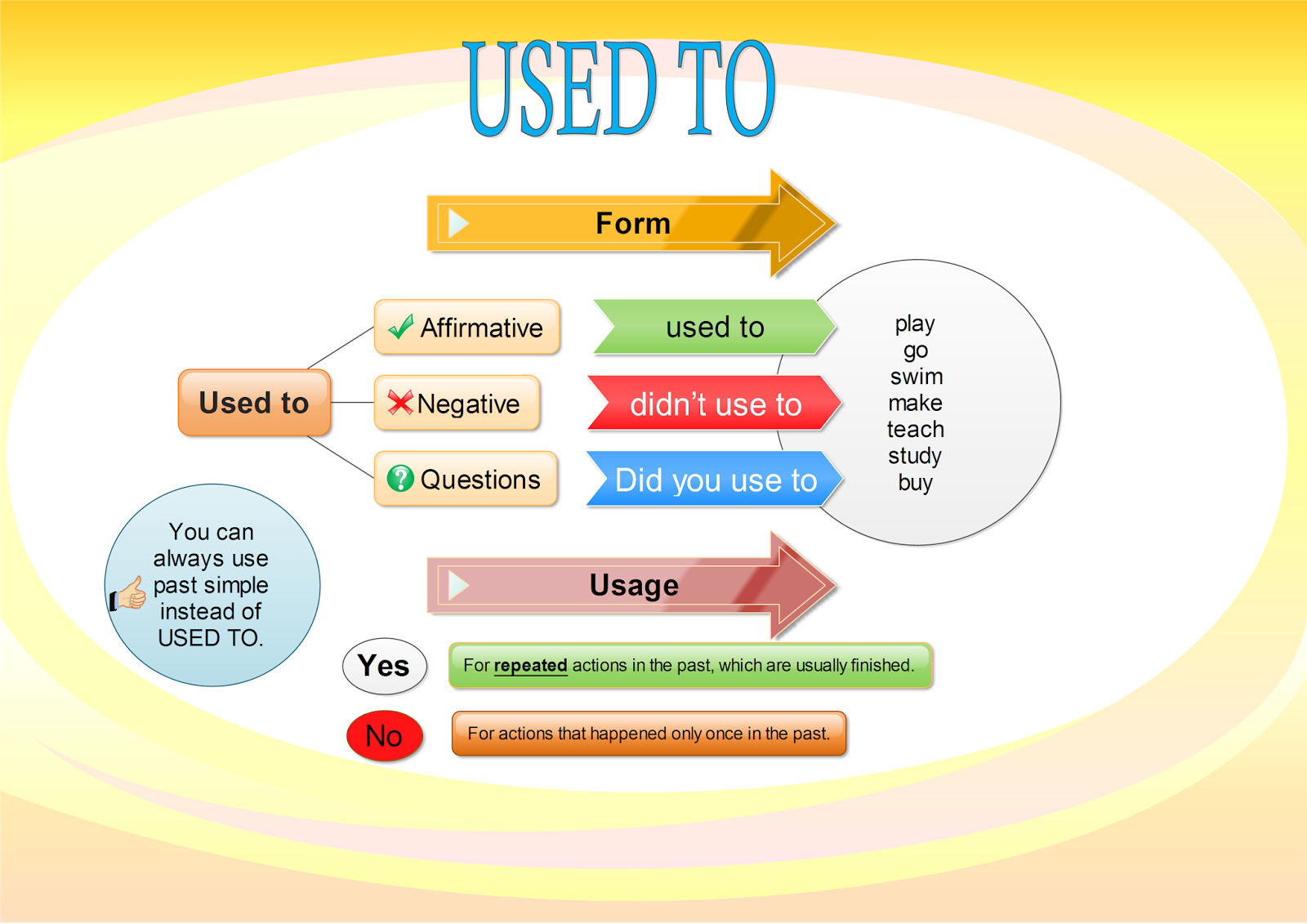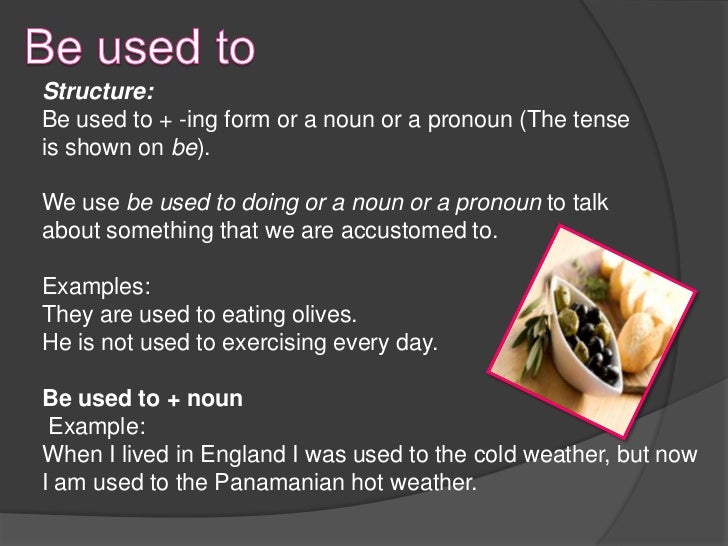Used to: meaning and form
We use used to when referring to things in the past that is no longer true. It can refer to repeated actions or a state or situation:
He used to play football for the local team, but he’s too old now.
That white house over there used to belong to my family. (It belonged to my family in the past, but not anymore.)
In statements, the form used to does not change. We do not use the verb be before it. It always refers to past time:
We used to go to the seaside every summer when I was a kid.
Note: We are used to going … or We use to go … or We were used to going …

We use “used to do” form when we are talking about something that happened regularly in the past but doesn’t happen any more.
| Positive Sentence | I used to drink five cups of coffee every day but I stopped a year ago. |
| When I was a teenager I used to love Lily. | |
| There used to be a supermarket but now it’s a restaurant. | |
| Negative Sentence | He didn’t (did not) use to workout regularly. |
| We didn’t use to go out together. | |
| Question | Did you use to watch a lot of TV? |
| Did she use to exercise every day? |
Negative: didn’t use to
The negative of used to is most commonly didn’t use(d) to. Sometimes we write it with a final -d, sometimes not. Both forms are common, but many people consider the form with the final -d to be incorrect, and you should not use it in exams:
It didn’t use to be so crowded in the shops as it is nowadays.
I didn’t use like broccoli when I was younger, but I love it now. (Don’t use this form in exams.)
In very formal styles, we can use the negative form used not to:
She used not to live as poorly as she does now.
Questions
The most common form of the question is auxiliary did + use(d) to. Many people consider the form with a final -d to be incorrect, and you should not use it in exams:
I think we met once, a couple of years ago. Did you use to work with Kevin Harris?
Didn’t she use to live in the same street as us? (Don’t use this form in written exams.)
Emphatic did
We can use the emphatic auxiliary did with used to:
We never used to mix very much with the neighbors, but we did used to say hello to them in the street. (Don’t use this form in written exams.)
Tags
We normally make tags after used to with auxiliary did:
He used to be your boss, did he?
We used to love going to the museum, didn’t we?
Used to or would?
We can use used to or would to talk about people’s habits in the past. When we use them both together, used to most commonly comes first, as it sets the scene for the actions being reported:
When we were kids, we used to invent amazing games. We would imagine we were the government and we would make crazy laws that everyone had to obey.
Used to, but not would, can describe a state or situation which is no longer true:
We used to live in Manchester.
Note: We would live in Manchester.
‘The Townhouse’ used to be a Greek restaurant. It’s Italian now.
Not: ‘The Townhouse’ would be a Greek restaurant …
Used to or be used to?
Used to refer to actions and situations in the past that no longer happen or are no longer true. It always refers to the past:
She used to sing in a choir, but she gave it up. (She sang, but she doesn’t sing anymore)
Be used to means ‘be accustomed to’ or ‘be familiar with. It can refer to the past, present , or future. We follow to be used to with a noun phrase, a pronoun, or the -ing form of a verb:
I work in a hospital, so I’m used to long hours. (I am accustomed to/familiar with long hours.)
She lives in a very small village and hates traffic. She’s not used to it.
He was a salesman, so he was used to traveling up and down the country. (He was accustomed to/was familiar with traveling.)
We can also say get used to or (more formally) become used to:
University is very different from school, but don’t worry. You’ll soon get used to it. (or, more formally, You’ll soon become used to it.)

Be used to + doing
There’s a big difference between used to do – to talk about past habits or states and is used to doing – to talk about our familiarity with a place, or activity.
The form is subject + verb to be + used to + verb in the ing form / noun
“I am / was used to studying English every day.”
“I am used to his jokes.” (example with a noun)
“You are / were used to studying English every day.”
“He is / was used to studying English every day.”
You can change the verb “to be” with the verb “get” to talk about the process of becoming used to something (rather than the state of being used to something).
“If you live in England, you will get used to driving on the left!” (= it will no longer be a problem for you)
“He finally got used to the winter weather.”
Don’t make the mistake of combining both forms to make an ungrammatical sentence like “I am used to study.”
Remember: Either “I used to study” (past habit but no longer true) or
“I am used to studying” (I am familiar with studying).

